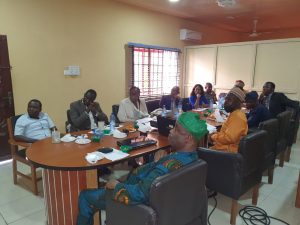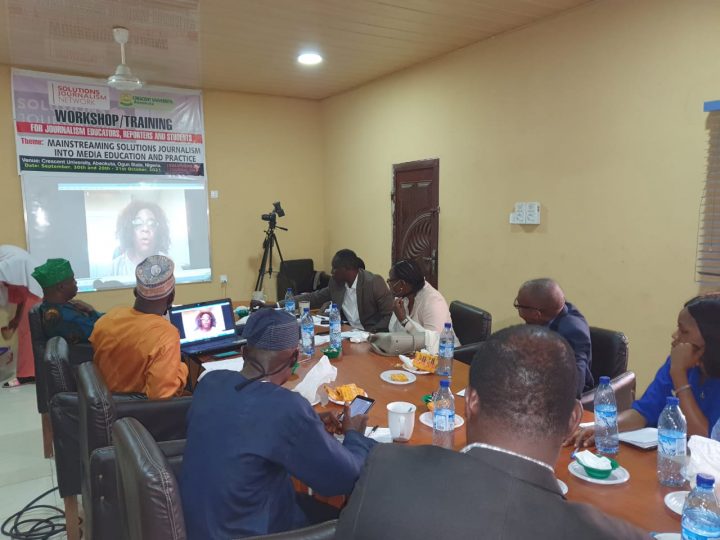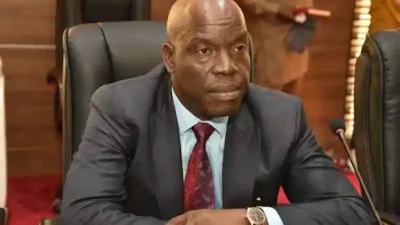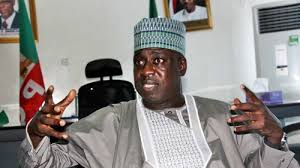By IDRIS KATIB
Crescent University, Abeokuta, Nigeria has pioneered a campaign to incorporate Solutions Journalism (SoJo) in the mass communication curriculum in Nigeria.
The institution, which prides itself as Citadel of Academic and Moral Excellence, organised the workshop for media educators in Ogun State tagged, “Mainstreaming Solutions Journalism into Media Education and Practice”, where scholars conceded that regulators of education, such as National Universities Commission (NUC) and National Board for Technical Education (NBTE), should be lobbied into the incorporation of Solutions Journalism in mass communication curriculum.

*Participants at the workshop on Solutions Journalism, organised by Crescent University, Abeokuta, Nigeria in conjunction with Solutions Journalism Network (SJN), held in the university’s Department of Mass Communication, Abeokuta, Ogun State, on Monday 4 October, 2021.
The workshop, which comprised six higher institutions in Ogun State, was held in the Department of Mass Communication, Crescent University, Abeokuta in conjunction with Solutions Journalism Network (SJN) and facilitated by a lecturer in the Department, Mr Jamiu Folarin, who is also a Fellow of SJN.
In her presentation themed, “Solutions Journalism 101”, another Fellow of Solutions Journalism Network, Seun Durojaye, defined Solutions Journalism as an evidence based reporting to solve social problems, emphasizing that Solutions Journalism helps to tell a complete balanced story.
She maintained that “for you to have a solutions journalism, there has to be a solution that tackles a problem.
“Solutions Journalism covers a response to a problem and how it happened. It provides evidence of impact, looking at effectiveness, not just intentions.In Solutions Journalism, there must be limitations which should be expressed”, she explained.
Durojaye identified some of the benefits of Solutions Journalism as holding leaders accountable, civil engagement and cross-pollination where communities would learn something happening elsewhere, which will eventually spark discussion and action.
In his goodwill message, Mr Chibuike Alagboso of Nigeria Health Watch corroborated that, “SoJo is a strategy that will reorientate the incoming journalists to be able to compete with their counterparts globally”.
In her contributions via Zoom, Director of Journalism Partnerships, New York, Francine Huff, emphasized the essence of curriculum building with the inclusion of elements of Solutions Journalism.
In his perspective, Head of Department of Mass Communication, Crescent University, Dr. Kola Adesina, said Solutions Journalism, which is an offshoot of Development Communication and Social Responsibility Theory, is not adversarial.
He, however, proposed 5Ws and what he termed “the context”, which, according to him, should be well expanded to cover Who, What, Where, When, Why and How an event happened, adding that SoJo should not be assumed as a one-size-fits-all to all situations and contexts.
Other scholars like Head of Department of Mass Communication, Olabisi Onabanjo University, Ago-Iwoye, Dr. Dele Odunlami, and Head of Department of Mass Communication, Moshood Abiola Polytechnic, Abeokuta, Dr. Funmi Alakija, agreed that SoJo, as an essential part of Development Journalism, would help in training and retraining journalists
The workshop witnessed participants from Olabisi Onabanjo University, Ago-Iwoye, Crawford University, Igbesa, Crescent University, Abeokuta, MCPherson University, Federal Polytechnic, Ilaro, and Moshood Abiola Polytechnic, Abeokuta.
Scholars conceded that courses like News Writing and Reporting, Data Journalism, Precision Journalism, Specialist Journalism, Reporting Religion, Writing for Broadcast, Digital Journalism, Conflict Reporting, Communication and National Development, Features Writing and others should accommodate Solutions Journalism with creativity on the part of the educators.




